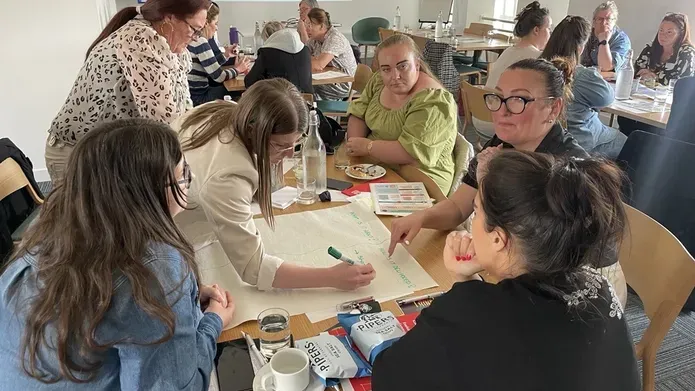Press release
Report shows benefit of training health advocates within the Gypsy/Traveller community
Research from the University of Dundee has shown that training members of one of Scotland’s most marginalised groups to advocate for their community on health and social care issues can lead to significantly improved outcomes
Published on 24 April 2025

The University’s School of Health Sciences yesterday launched a new report, ‘Evaluation of a Gypsy/Traveller Community Health Worker (CHW) service’ alongside members of that community, representatives from the Scottish Government, the organisation Minority Ethnic Carers of People Project (MECOPP), Public Health Scotland and NHS Boards.
The report evaluated the two-year Community Health Worker service in Scotland, which trained Gypsy/Travellers as CHWs to bridge the gap between their community and health and social care services.
Gypsy/Travellers in the UK face significant health disparities, with life expectancy being lower than the general population by around 15 years for men and 11 years for women.
Previous research from the School of Health Sciences informed the Gypsy/Traveller Scottish Government’s action plan 2025-2027 to improve the lives of Gypsy/Travellers, and Public Health Minister Jenni Minto praised the service and the research in a video address played at the launch.
She said, “I would like to thank the University of Dundee and Minority Ethnic Carers of People Project for organising this collaborative knowledge exchange event to celebrate and reflect on the success of the Gypsy/Traveller Community Health Worker Service in Scotland.
“The achievements today have only been possible through collaboration and partnership working with a clear shared vision to reduce racialised health inequalities and improve health outcomes in Scotland. You are tackling the unique challenges that are experienced by the Gypsy/Traveller community head on, and I am very grateful for that.”
Between December 2021 and August 2023, the CHWs made initial contact with around 1,000 Gypsy/Travellers. The report found they were an essential resource in uncovering the obstacles faced by the Gypsy/Traveller community and breaking down barriers to accessing healthcare and other services.
The CHWs also extended support and information to the wider Gypsy/Traveller community due to their influence and close-knit culture. Having, MECOPP, a third sector organisation, delivering the service, was essential to ensure the service was community-led.
Participants praised the CHWs for improving trust between the community and healthcare professionals. Most importantly, the participants expressed the value of having someone reliable to provide support and information.
The 26 recommendations made in the report include requirements for Health Boards to:
- Provide a CHW service that has sufficient capacity to be accessible to all Gypsy/Travellers in Scotland
- Offer flexible appointments and drop-in services for Gypsy/Travellers as they may face additional challenges accessing scheduled appointments
- Collaborate with CHWs to develop innovative strategies to improve access to health services including vaccinations and cancer, and diabetes screening.
While only 4000 people in Scotland have self-identified as members of this community, it is thought the true number of Gypsy/Travellers may be around 15-20,000. Gypsy/Travellers face high rates of homelessness, unemployment and poverty, as well as regular discrimination.
Alongside the report, three further resources were launched, including a video, co-produced with Gypsy/Travellers, showing the impact of the CHW service. The Dundee research has been led by Dr Alison McFadden and Dr Camila Biazus-Dalcin, from the School of Health Sciences.
Dr Biazus-Dalcin said, “On almost every measure, Gypsy/Travellers experience worse outcomes than the general population and similarly disadvantaged groups.
Structural racism is a key reason for this, and CHWs are best placed to reduce stigma and improve access to treatment and preventative measures. CHWs have the potential to significantly improve health outcomes for the Gypsy/Traveller community by acting as a bridge between the community and health services.”
Violet Stewart, one of the community members present at the event, added, “The CHWs are so important because they are Travelling people and I am so grateful for how they are helping to improve the health of the community.”
Funding for the CHW service was provided by the Scottish Public Health Network and the Directorate of Population Health.